Kandela (Jind): Hundreds of women from Haryana’s Jind travelled to Kandela village in the district on tractors, vans and bullock carts to attend the first ‘mahila mahapanchayat’ Wednesday.
This is the first all-women mahapanchayat organised ever since the farmers’ protests started on Delhi borders late November. Farmers have been mobilising to push their demand for a rollback of the farm laws by organising mahapanchayats in villages across Haryana and Uttar Pradesh after the 26 January violence in Delhi.
Women across all ages — from 16-year-olds to 60-year-olds — attended the mahapanchayat, where they raised slogans against the Modi government, demanding that the “black laws” be repealed.
‘Kala kanoon wapas lo’, ‘Nari shakti zindabad’ rent the air as women, many of them wearing ghoonghat (headcover), went to the stage to raise their demands and speak their mind.

The women demanded equal pay as farmers, 50 per cent reservation in panchayats and Parliament, and recognition not just as housewives, but also as farmers.
“Be aware, educate yourself, educate your children,” said Punjabi actress Sonia Mann from the stage, who came from Tikri to attend the mahapanchayat. She is at the forefront of the Tikri protests.
Farmer leader Sudesh Goyat, who has been camping at Tikri since the last three months, said she wanted women to help each other out.
“We should put an end to the discrimination that happens in Haryana. We should help each other, rather than putting each other down,” she said from the stage.
The women said it’s “empowering” to speak from the stage.
“Beti, you won’t understand, the very act of holding that mic and telling our story, putting forth what you want is empowering enough,” said a woman farmer, who didn’t want to be named.
The first time women from Haryana were allowed to participate in a khap panchayat was in 2010.
“Earlier women weren’t even allowed anywhere near the stage of a khap. Now they’re running the show. Even now I found some women outside, who were just listening from outside, apprehensive about entering a khap,” Goyat told ThePrint.
Also read: How India can benefit from the ongoing feminisation of agricultural workforce
‘Much-needed change’
For women farmers hailing from a state infamous for its gender orthodoxy and high female foeticide rates, the first ‘mahila mahapanchayat’ carried immense significance as it brought an opportunity for women to demand a change in their status.
“The labour of women farmers goes unrecognised, often characterised as household work. They’re paid much less than men too. Where a man earns Rs 500, a woman earns Rs 300 for the same job,” said Goyat.
“We also want 50 per cent reservation for women, not just in panchayats, but even in the Parliament. That’s our demand,” she added.
It is unprecedented, women farmers said, to see women from the state mobilise in such large numbers and step out of their homes, much less to participate in politics and be vocal about issues that they face.
From not being allowed anywhere near khaps to now organising mahapanchayats, it’s a big leap for women in the state.
“See, orthodox people remain orthodox and frown at women coming out like this. But the younger generation has a more liberal worldview, which is supporting this much-needed change in society,” Sikkim Nainshuka, Jind district’s mahila pradhan, told ThePrint.
Nainshuka also said the farmers’ protest has helped women come out of their homes and participate in the movement.
“Many women were limited to chula–chokha (kitchen). They first stepped out of their houses, then found a resolution, and then started voicing their demands. Women now are acutely aware of their rights and are actively fighting for them. The empowerment we thought would happen in a decade is now happening within 10 days,” she added.
‘Urging women to come out and participate in debate’
Khap leaders said they’re also helping generate awareness and mobilise women on the ground.
“We’re going from house to house, urging women to come out and participate in debate and discussion, informing them of our cause. We’re urging them to come out and support us,” Dr Santosh Daiyya, national president of ‘Sarv khaaps’ in Haryana, told ThePrint.
Daiyya claimed she headed the first-ever khap in 2010 where women were allowed to participate.
Goyat said it wasn’t always easy to convince organisers of farmers protests to let women have equal participation, and she, along with other women, has worked slowly and steadily to bring women to the forefront of these demonstrations.
“Earlier they wouldn’t let us stand on the stage or be on stage for a day’s hunger strike, saying they were concerned about the women’s health,” Goyat said.
“I went on a hunger strike (at Tikri last December) for two days, but wasn’t allowed to sit on the stage. It was only later that I was allowed on the stage and be at the forefront of protests, after the organisers recognised our value,” she added.
(Edited by Debalina Dey)
Also read: ‘We can lead a revolution’ — women take centre stage at farmer protests at Singhu border



